Do you have a question about the Motorola MTP830 S and is the answer not in the manual?
Instructions for safe usage and RF exposure compliance guidelines.
Explanation of graphic icons used throughout the documentation set.
Details on how to use the guide and special notations employed.
Details technical specifications like voltage, current, power, and operating temperature.
Instructions to follow before powering on the radio for the first time.
Procedure for attaching the antenna to the radio.
Step-by-step guide for installing the battery into the radio.
Procedure for safely removing the battery from the radio.
Instructions on how to charge the radio's battery correctly.
Explanation of battery charging indicators on the radio display.
Details on how the radio indicates a low battery level.
Overview of the radio's physical controls and indicator lights.
Information about the radio's display screen elements and layout.
Explanation of various status icons displayed on the radio screen.
Procedure for powering the radio on and initial setup.
Steps to unlock the radio after powering on.
How to lock and unlock the radio's keypad and buttons.
Guidance on how to hold the radio for optimal microphone and speaker use.
Information on how to use different network modes on the radio.
Explanation of the features and requirements of Trunked Mode.
Procedure to enter the Trunked Mode Operation (TMO).
Methods for selecting a talkgroup in TMO or DMO mode.
Steps to initiate a group call while in Trunked Mode.
Details on activating and using Transmit Inhibit Mode.
How to activate talkgroup scanning for monitoring calls.
Procedure for dialing numbers using the soft numeric keypad.
Information about making and receiving broadcast calls.
How to use the Ambience Listening feature for remote listening.
Details on assigning and using features with One-Touch buttons.
How to temporarily disable/enable the radio remotely.
How to permanently disable the radio remotely if lost or stolen.
How to switch between high and low audio output levels.
Instructions for entering text using the radio's interface.
Explanation of icons used in the text entry screen.
Description of key functions during text entry.
Overview of the Emergency Mode and its priority.
Procedure for initiating and receiving emergency group calls.
How to make and receive disaster alert calls in critical situations.
Details on Silent Emergency Mode with no audible or visible indications.
Information on operating the radio in Repeater Mode.
Steps to enter Repeater Mode.
Tips to improve the accuracy and success rate of GPS location calculations.
Procedure to enable the GPS feature on the radio.
Explanation of the GPS icon displayed on the radio screen.
Details on various formats for displaying GPS location coordinates.
How to view the radio's current or last calculated GPS position.
Options for adjusting GPS accuracy and power consumption.
Important considerations and limitations for using the GPS feature.
Instructions on how to navigate through the radio's menu items.
Explanation of icons used in the menu for quick identification.
Overview of the radio's menu hierarchy and organization.
Features for sending and receiving text messages.
Procedure for creating and sending a new message.
How to send a text message to a private number or phone.
How to send a text message to a group.
Accessing and managing incoming messages.
Steps to access the message Inbox.
How to save a phone number found within a message.
Managing predefined and user-defined message templates.
Features for sending status messages.
Managing the radio's contact list.
Procedure for adding a new contact to the list.
How to modify existing contact information.
Enabling PIN code authentication for radio security.
Steps to set up a PIN code to protect the radio.
Configuring the automatic keypad lock feature.
Features for enabling and managing air interface encryption for security.
How to check the current status of Air Encryption.
Verifying the validity of the system authentication key (K).
Checking the validity of the TMSCK for TMO encrypted calls.
Checking the validity of the DMSCK for DMO encrypted calls.
Enabling Covert Mode to make the radio unnoticeable.
Information on the Man Down feature that monitors radio status.
How to configure and activate the Man Down feature.
Settings for radio vibration alerts for incoming calls.
Options for customizing incoming call ring styles.
Adjusting volume levels for various audio outputs.
Changing the radio's display language.
Configuring the radio for data transmission and reception.
Selecting or customizing audio profiles for different environments.
Enabling and setting up the howling suppression feature.
Controlling audio routing between speaker and earpiece.
Setting how volume levels are adjusted (Individual or Common).
Activating and deactivating various radio alert tones.
Enabling or disabling keypad tones for button presses.
Configuring periodic tones for missed calls, messages, and low battery.
Settings for the Double Push-To-Talk (D-PTT) tone feature.
Adjusting various display settings for the radio.
Enabling display flip for users wearing the radio on shoulder or lapel.
Adjusting text size on the display for better visibility.
Configuring the screen saver feature.
Adjusting backlight intensity for needs and conditions.
Changing the idle screen background image.
Adjusting display contrast for enhanced visibility.
Controlling the display of time and date on the home screen.
Configuring whether time and date are shown on the display.
Selecting between 12-hour and 24-hour time formats.
Choosing the display format for dates (DD/MM/YY, MM/DD/YY, etc.).
Manually setting the time if automatic update fails.
Adjusting the time offset for different time zones.
Configuring automatic time and date updates from the infrastructure.
Activating Energy Economy mode to save battery life.
Steps to enable or disable the Energy Economy feature.
Choosing between Class 3L and Class 4 transmission power.
How to select high or normal RF power.
Configuring audio modes and button options for connected accessories.
Choosing the connected accessory from a list.
Settings for automatically accepting or rejecting book on requests.
Procedure to edit book on settings (Accept or Reject).
Setting the functionality of the ROTARY KNOB.
Choosing the mode for the rotary knob (Dual, Volume, Scroll).
Configuring the lock status for the rotary knob.
Defining rotary knob behavior when the keypad is locked.
Enabling or disabling wrap-around scrolling for the rotary knob.
Defining the scroll range for talkgroups and folders.
Confirming talkgroup selection with the rotary knob.
Setting SIDE buttons based on rotary knob mode.
Managing scanning settings and favorite group lists.
Activating, viewing, and editing scan lists.
How to activate talkgroup scanning for monitoring calls.
Editing talkgroups within the active scan list.
Procedure for setting up new scan lists.
Options for renaming, clearing, or adding groups to scan lists.
Managing favorite group lists.
Steps to create a new folder for favorite groups.
How to add a talkgroup to a favorite folder.
Options for renaming or deleting favorite folders.
How to remove a talkgroup from a favorite folder.
Viewing personal, phone, and radio information.
How to view and edit personal radio information.
Viewing the history of dialed, received, and missed calls.
Steps to access and view the list of recent calls.
How to initiate calls directly from the recent calls list.
Saving recent call numbers into the contact list.
How to remove entries from the recent calls list.
Logging in and out of the radio system using RUI.
Procedure for logging onto the radio system.
Procedure for logging off from the radio system.
Switching between different radio operation modes.
How to select and register to a network.
Migrating to another network when out of home coverage.
Migrating to a predefined network when out of home coverage.
Registering to any network when home coverage is lost.
Migrating to another network when out of home coverage.
Switching between Trunked, Direct, Repeater, or TXI modes.
Information on GPS Location Service.
How to view the radio's current or last calculated GPS position.
Options for adjusting GPS accuracy and power consumption.
Using Packet Data Service for data transfer.
How to view data transfer statistics like sent/received data.
Checking the encryption status of the ongoing packet data session.
Details on making private, point-to-point calls.
Procedure for initiating a private call.
Procedure for dialing numbers using the soft numeric keypad.
Making calls to landline telephones or PABX extensions.
Steps to initiate a phone or PABX call.
Using shortened numbers for dialing Phone/PABX contacts.
Procedure for dialing using Phone/PABX speed dial numbers.
Using MS-ISDN and ISSI for addressing calls and messages.
Communicating with automated answering devices using DTMF tones.
Dialing partial numbers that the radio automatically completes.
Introduction to Wireless Application Protocol (WAP) for mobile web access.
Using the WAP browser for accessing mobile web content.
Procedure to open and close the WAP browser.
Navigating through the different menu panes within the browser.
Recommendations for efficient and easy web browsing.
How to create a bookmark from the Navigate pane.
How to create a bookmark from the Bookmarks pane.
Procedure for accessing and using saved bookmarks.
How to save a web page for offline browsing.
How to access and browse saved web pages.
Handling situations where Packet Data Service is unavailable.
Conditions under which browser entry is disabled.
Description of key functions when the browser is active.
Overview of the different panes available in the browser menu.
Accessing home page and commonly used items in the browser.
Advanced browser settings including downloads and security.
Managing bookmarks and saved pages.
Managing bookmarks using the options pane.
Managing saved web pages and their snapshots.
Viewing the list of recently visited web pages.
Steps to access a recently visited URL.
Accessing browser applications and utilities.
Pane specific to the current page or pane being displayed.
Viewing and managing downloaded images.
Inputting text for URLs and other fields.
Receiving WAP content pushed to the radio.
Types of WAP messages and their priority levels.
How to view received WAP messages.
Receiving and managing call-out alerts.
Details on the different types of call-out alerts available.
How Call-Out feature interacts with other radio modes.
Description of the phases involved in a Call-Out service.
Using Voice Operating Transmission for hands-free operation.
Lists various radio tones with their default tone diagrams.
Lists LED indications and their corresponding status meanings.
Lists common messages and their descriptions for troubleshooting.
Guidelines for proper battery storage conditions.
Tips and practices to maximize the battery's service life.
Information on the optimal temperature range for battery charging.
Rules and best practices for charging the radio battery.
Important warnings and cautions related to battery handling and safety.
| Brand | Motorola |
|---|---|
| Model | MTP830 S |
| Category | Two-Way Radio |
| Language | English |
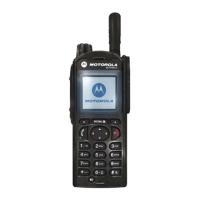

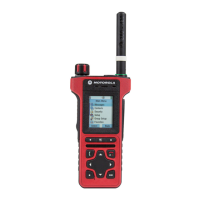
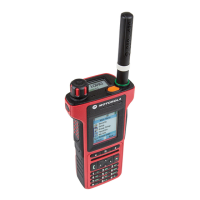
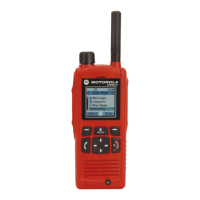


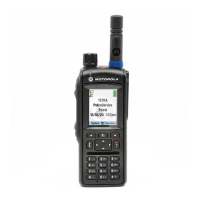

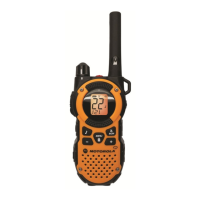
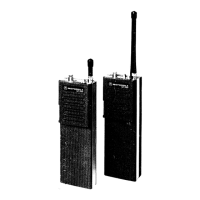

